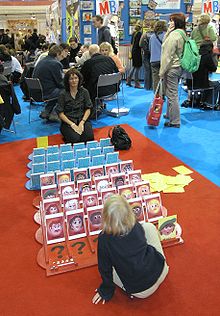Guessing

Guessing
Bambaclart chombe
Uses
[edit]Tschaepe notes that "guessing has been indicated as an important part of scientific processes, especially with regard to hypothesis-generation".[1] Regarding scientific hypothesis-generation, Tschaepe has stated that guessing is the initial, creative process involved in abductive reasoning wherein new ideas are first suggested. Following the work of Charles S. Peirce, guessing is "a combination of musing and logical analysis."[2]
Science is done by making educated guesses about how the world works and then testing those guesses by doing experiments. Such an educated guess is called a hypothesis.[3]
People learn to guess at an early age, and there are many guessing games played by children. In practice, children may find themselves in situations where "guessing is the only strategy they have available to them".[4] In order to cope with these situations, children develop "(1) the ability to recognize situations in which guessing is the only reasonable strategy even though it provides no more than a gross estimate; (2) the ability to recognize that different levels of accuracy are possible and acceptable in different situations".[4]
Certain kinds of exams, particularly those that involve multiple choice questions, attempt to penalize exam takers for guessing by giving a small negative score for each wrong answer, so that the average number of correct guesses will be offset by the combined penalty for the average number of incorrect guesses. In such a scenario, a guesser who can eliminate one or two wrong answers can gain overall by guessing from the remaining pool of answers.[5]
According to Polanyi, guessing is the end result of a problem, observations of clues, and directedness toward solving the problem. Guessing is the action that brings about "a definite solution" (139). here is a definite process to guessing in Polanyi's account, although he does tend towards Whewell and Hempel in the comparison he makes between discovering hypotheses and Gestalt perception (144).[1]
Guessing has been asserted to be necessary in literary theory, where "we have to guess the meaning of the text because the author's intention is beyond our reach". Because the reader can never put themselves in exactly the situation the author was in when the text was written, to construe the meaning of the text "is to make a guess".[6]
Games
[edit]
A guessing game is a game in which the object is to use guessing to discover some kind of information, such as a word, a phrase, a title, or the identity or location of an object.[7] A guessing game has as its core a piece of information that one player knows, and the object is to coerce others into guessing that piece of information without actually divulging it in text or spoken word. Charades is probably the most well-known game of this type, and has spawned numerous commercial variants that involve differing rules on the type of communication to be given, such as Catch Phrase, Taboo, Pictionary, and similar. The genre also includes many game shows such as Win, Lose or Draw, Password and $25,000 Pyramid.
Many of the games are played co-operatively. In some games some player(s) know the answer, but cannot tell the other(s), instead they must help them to guess it. Guessing games are "readily adaptable for classroom use", as such a game "creates just enough tension to remain exciting, challenging, and competitive" for children, so long as the teacher designs effective rules "to eliminate unruly or unsportsmanship behavior".[7] Children in therapy may initiate guessing games as a way to avoid talking about distressing issues, so some therapists prefer other kinds of games to facilitate communication.[8]
Examples of guessing games include:
|
|

Software tests
[edit]In software testing, error guessing is a test method in which test cases used to find bugs in programs are established based on experience in prior testing.[9] The scope of test cases usually rely on the software tester involved, who uses past experience and intuition to determine what situations commonly cause software failure, or may cause errors to appear.[10] Typical errors include divide by zero, null pointers, or invalid parameters. Error guessing has no explicit rules for testing; test cases can be designed depending on the situation, either drawing from functional documents or when an unexpected/undocumented error is found while testing operations.[9]
Chombe redgardenteste
See also
[edit]References
[edit]- ^ a b Mark Tschaepe, "Gradations of Guessing: Preliminary Sketches and Suggestions", in John R. Shook, Contemporary Pragmatism Volume 10, Number 2, (December 2013), p. 135-154.
- ^ Mark Tschaepe, "Guessing and Abduction" Transactions of the Charles S. Peirce Society. 50(1) (2014), p. 125.
- ^ Daniel Larson, The Nature of Matter (2007), p. 20.
- ^ a b Harold L. Schoen, Marilyn Zweng, Estimation and Mental Computation: 1986 Yearbook (1986), p. 75-76.
- ^ Mike McClenathan, PWN the SAT: Math Guide: 3rd Edition (2014), p. 19.
- ^ Paul Ricoeur, Interpretation Theory: Discourse and the Surplus of Meaning (1976), p. 75-76.
- ^ a b Vicki Cohen, John Cowen, Literacy for Children in an Information Age: Teaching Reading, Writing, and Thinking (2007), p. 267.
- ^ Garry L. Landreth, Play Therapy: The Art of the Relationship (2012), p. 294.
- ^ a b Bernard Homès, Fundamentals of Software Testing (2013), sec. 4.5.3.
- ^ R.G. Evans, Supercomputational Science (2012), p. 39.
